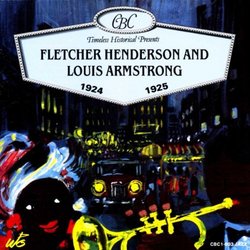| All Artists: Fletcher Henderson, Louis Armstrong Title: Fletcher Henderson and Louis Armstrong Members Wishing: 0 Total Copies: 0 Label: Timeless Holland Release Date: 8/11/1998 Album Type: Import Genres: Jazz, Pop, Classic Rock Styles: Swing Jazz, Traditional Jazz & Ragtime Number of Discs: 1 SwapaCD Credits: 1 UPC: 8711458100335 |
Search - Fletcher Henderson, Louis Armstrong :: Fletcher Henderson and Louis Armstrong
 | Fletcher Henderson, Louis Armstrong Fletcher Henderson and Louis Armstrong Genres: Jazz, Pop, Classic Rock
|
Larger Image |
CD Details |
CD ReviewsA misguided experiment 04/30/2003 (2 out of 5 stars) "This record contains a selection of Louis Armstrong's work in the Fletcher Henderson Orchestra with audio restoration by John R.T. Davies. It should be wonderful, but the producers of the record felt that the Henderson orchestra of this era was tough going for the modern listener and decided to focus only on Armstrong's work. The result is mainly a series of audio clips far shorter than the average recording of the mid twenties and stripped of the trappings. In a few exceptional cases, Timeless gives you full tracks, or in a couple of cases, the full track with an additional solo by Armstrong from an alternate take skillfully tacked in. More of these might have made the disc worthwhile. As it is, this is a misguided experiment and you're far better off with a wonderful 3-CD set on the Canadian Forte label, also using work by John R.T. Davies" A bad idea that worked bukhtan | Chicago, Illinois, USA | 10/16/2006 (4 out of 5 stars) "I have a "Jazz Heritage - Musical Heritage Society" re-issue of this product, which I snatched up cheap in a used CD bin down in Chicago, seeing the magic words "John R. T. Davies" on the back cover. I didn't realize that it was an "edited" (leaving out the cuss words) product until I got home. I'm entirely opposed to meddling with history, and was surprised that the great late Davies would have truck with such business. However, I have to say that I've enjoyed listening to this CD. Not only am I surprised that even Davies could extract this kind of listenability from those old acoustic 78's, but I'm amazed that even the great Armstrong was this great this early. These records precede the Hot Fives and Hot Sevens, yet I seem to hear a greater incisiveness, clarity and force than I hear in the first year or so of the Chicago recordings. The radically different arrangements, and presumably, the gentle leadership of Henderson, seem to elicit something still only latent in Louis. As I say, I'm opposed to cutting and editing and re-writing history, and I agree with everything the previous reviewer said along these lines. In theory, anyway. However, at this stage in Henderson's progress, it was tempting. Davies and company (Dutch jazz enthusiasts working for Timeless) did in fact let several of the records run in toto, and you'll see that the band hadn't gotten very far yet. Coleman Hawkins, though notable, was not yet the great soloist he would become, and in fact is outclassed, to my ears, by the trombonist Charlie Green. And the arrangements, well, I guess I'd have to say most are somewhat banal. Even Don Redman doesn't really shine yet. Compare them to the arrangements Henderson was using later in the Twenties; what a difference. Yes, Louis is the center of attention here. And this CD seems to be more available than the full three-CD Timeless release, or the King Jazz issues (now based in Italy? a label that Mezz Mezrow once had something to do with, if that's any recommendation). In any event, whatever we may think of this present-day restoration of the music, it seems to me that the music itself represents the birth of the African American jazz mainstream: the collision of black New Orleans music with black East Coast pop music. If you've heard the early King Oliver sides, and even the Red Onion Jazz Babies 78's (recorded right before Louis' trip to New York), you'll hear something very different on these records. The dynamism of the Fletcher Henderson recordings equals, nearly, the Jelly Roll Morton sides of the next year, and if they're aesthetically less striking, they offer a road forward that Morton's best records, innately conservative as they were, did not." Remastering - early Armstrong Billweinstein | 03/02/2005 (4 out of 5 stars) "Yes, this is a remastered recording focusing on Louis Armstrong.
This is early Fletcher Henderson. If you are looking for the mature Fletcher Henderson swing band sound I would recommend a later recording, but as a history of the collaborative effort, with Armstrong in the lead, this is Fine. Buy THIS to hear the roots of Louis Armstrong's rhythms and tones." |

 Track Listings (26) - Disc #1
Track Listings (26) - Disc #1